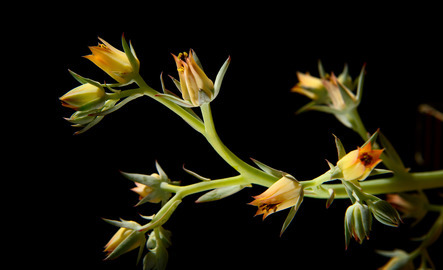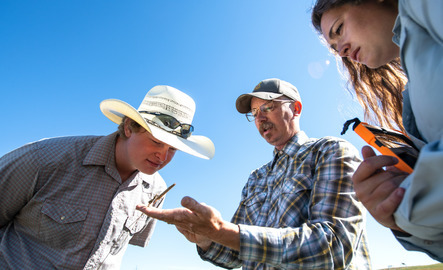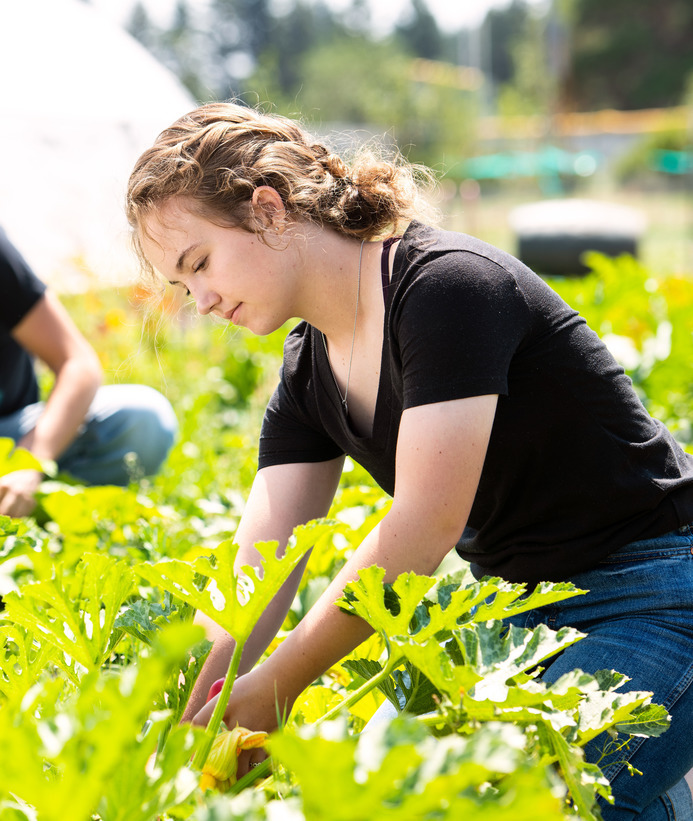About the Plant Sciences Degrees
UW’s accelerated plant sciences program blends undergraduate coursework with graduate
research, culminating in the achievement of a B.S. and M.S. degree. Students in this
program earn a B.S. in Plant Production and Protection or Rangeland Ecology and an M.S. in Plant Sciences.
Designed for highly motivated undergraduates, this program allows you to begin taking
graduate courses and pursuing specialized research in your junior year. You’ll explore
courses in ecology, watershed management, sustainable agriculture, seed science, and
more.

To join the QuickStart program, you must meet the following minimum criteria:
- Completion of 60 credit hours
- Overall GPA of at least 3.0
- GPA of at least 3.0 in PLNT, RNEW, and REWM courses
- At least three letters of recommendation (at least two must be from UW faculty)
- A plant sciences faculty member must be willing to serve as your M.S. advisor
- At least one other plant sciences faculty member must be willing to serve as your presumptive graduate committee member
- Research proposal submitted to and approved by your faculty advisor

What can you do with a plant sciences degree?
Achieving a bachelor’s and master’s in plant sciences opens the doors to a wide variety of careers in conservation, environmental science, biotechnology, and sustainability. Our graduates have gone on to work for government agencies, state programs, universities, and conservation organizations.
Plant sciences grads have gone on to work in the following roles:
- Conservationist
- Weed and Pest Supervisor
- Plant Technician
- Range Technician
- Variety Trials Manager
- Invasive Weed Management Technician
- Professor/ Community College Instructor
- Field Development Representative
Alumni of UW’s plant sciences graduate program are making an impact across the country! Here are some places where they’ve left their mark:
- United States Department of Agriculture (USDA)
- Montana Agricultural Experiment Station (MAES)
- Wyoming Weed and Pest Program
- Various Conservation Districts
- Natural Resources Conservation Service (NRCS)
- Pleasant View Gardens
- BASF
- University of Nebraska
A B.S./M.S. in Plant Sciences offers a fast-track option for motivated students to earn both degrees in less time and at a lower cost than pursuing them separately. This accelerated program allows you to dive into graduate-level research early, gain advanced knowledge in areas like crop production, pest management and plant biology, and graduate with a competitive edge in the job market or when applying to Ph.D. programs. It’s an ideal path for students ready to deepen their expertise and launch a career in agriculture, biotechnology or environmental science.
With an education in plant sciences, you can work in a variety of industries that
focus on agriculture, sustainability and biological research.
Common industries include:
- Agriculture and agribusiness
- Biotechnology and plant genetics
- Crop protection and agrochemical development
- Environmental consulting and restoration
- Seed and fertilizer production
- Horticulture, landscaping and greenhouse management
- Government agencies (e.g. USDA, EPA, state agriculture departments)
- Food production and safety
- Sustainable farming and agroecology
- Academic and private research institutions
Student Spotlight: Chelsea Turner
Meet Chelsea, a plant sciences major and botany lab TA at the University of Wyoming, whose passion for understanding plant composition is matched by her incredible personal journey. After facing and overcoming addiction, Chelsea has found purpose in ecology and plant science, using her experiences to fuel meaningful academic and personal growth. Her story is a powerful reminder that with resilience, support and determination, it’s never too late to start again—and thrive.
"The Plant Sciences QuickStart program was a cool opportunity to work a field season and earn graduate credits for my M.S. before even finishing my bachelor’s degree."
- Madison Wright | B.S. in Plant Production and Protection (2024) & M.S. in Plant Sciences (2025)


